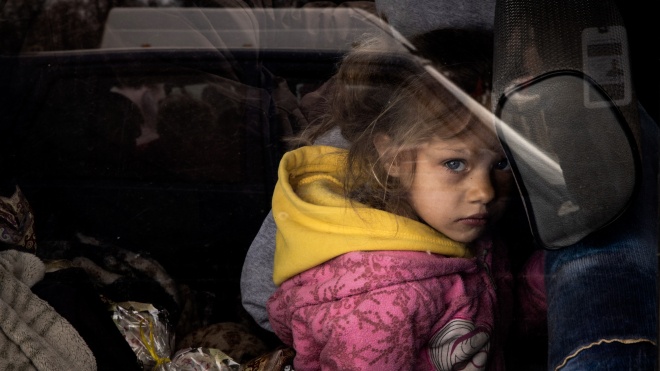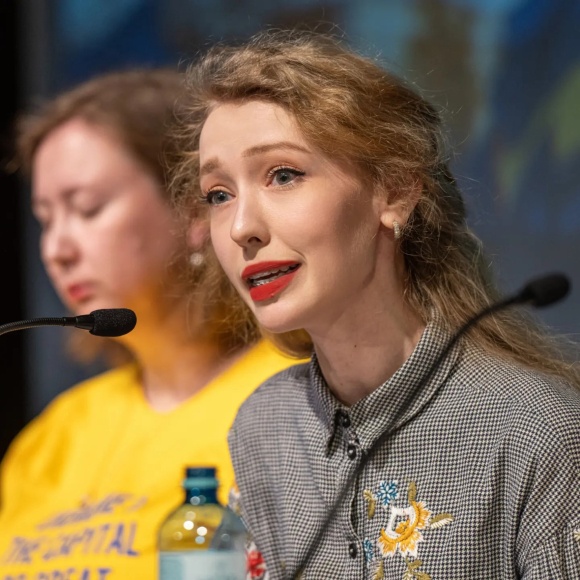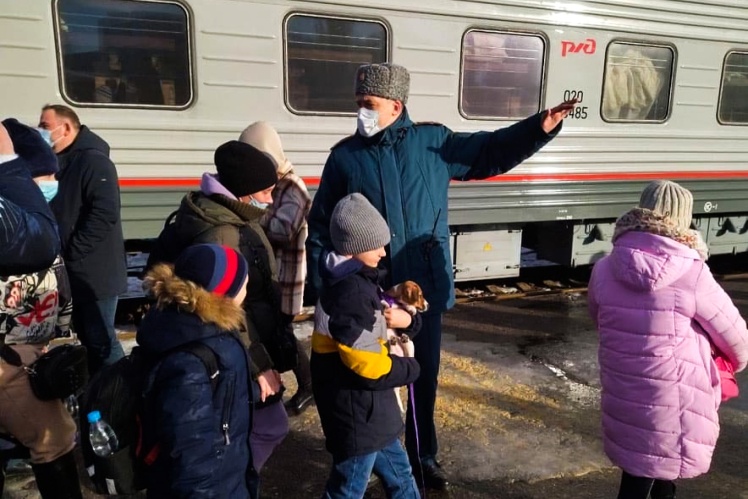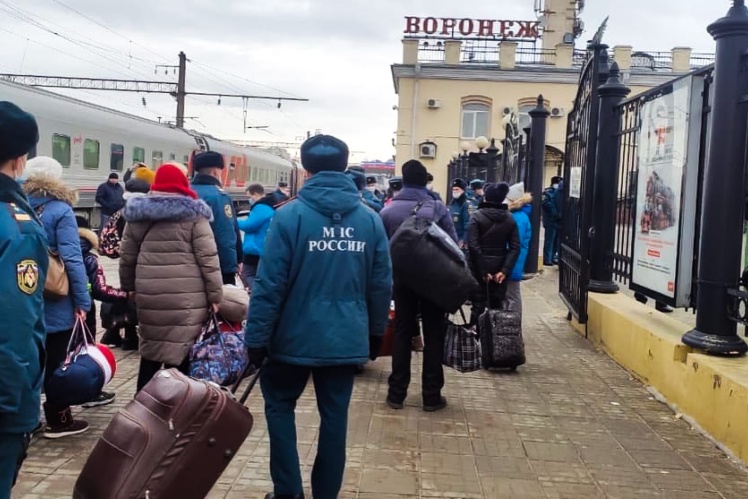How many children were taken to Russia in general?
It is difficult to say exactly because Russia does not respond to requests about the number of children taken out. Ukraine either collects information from open sources or draws conclusions from statements submitted by relatives or acquaintances of such children to law enforcement agencies or the National Information Bureau. The data are available on the Children of the War website — on September 5, there were 7,322 children. With reference to open sources, the site reports on 557,000 deported children. Gerasymchuk explains: this number is mentioned by the Russian mass media, it is rapidly increasing, but it isnʼt supported by any data. This number is checked by law enforcement agencies of Ukraine.
How long ago did it start?
The Russians began taking children from occupied Crimea and the occupied regions of Donetsk and Luhansk regions back in 2014. In October of the same year, the "train of hope" arrived in Crimea. This project was organized by the federal state radio station Radio Russia so that families and orphans could find each other on the territory of the Russian Federation. But the organizers decided to send such a train to the occupied Crimea. As a result of this "visit", the Russians adopted 12 Ukrainian children aged from 10 months to 8 years and took them to Moscow, Belgorod, Adygea, Krasnodar region and Voronezh region. The General Prosecutorʼs Office of Ukraine opened a criminal case, but at first it was registered as an illegal adoption and only later as a violation of the laws and customs of warfare. It is difficult to establish how many children the Russians took out of Crimea in general, because this information is hidden there. Kateryna Rashevska says that more than a hundred.
Kateryna Rashevska
Elizaveta Glinka, known as "Doctor Lisa", has been taking children from Donbas since 2014. Glinka and her organization Fair Help (Spravedlivaya Pomosch) in two years, almost 500 Ukrainian children were illegally taken from the occupied Donbas to the Russian Federation for treatment. Initially, this initiative, like the Train of Hope, was not a state program. Later it became known that it was supported by the Russian authorities. In 2014, then-Prime Minister Dmitriy Medvedev signed a decree that made Glinkaʼs personal project to take children from Ukrainian territories to Russia a state one — the Ministry of Emergency Situations, the Ministry of Health and the Investigative Committee were involved in it. In 2016, Glinka personally received the State Prize of the Russian Federation "For outstanding achievements in the field of human rights" from the hands of Vladimir Putin. Glinka was a member of the Council for the Development of Civil Society and Human Rights under the President of the Russian Federation.
Vladimir Putin and Elizaveta Glinka
Getty Images / «Babel'»
When Russia began a full-scale aggression, the taking of children from the temporarily occupied territory to the Russian Federation became state policy.
Who is being taken out?
These are different categories of children. Itʼs important to separate them so that later law enforcement agencies or the International Criminal Court can correctly classify the crimes of the occupiers.
One category is children who are deported by Russia together with their parents, one of their parents, or a guardian.
Darya Gerasymchuk
Another category is orphaned children or children deprived of parental care, or the ones who were in boarding schools or sanatoriums at the time of the aggression. This group also includes children whose parents died as a result of the full-scale Russian invasion. "There are children whose parents were injured while leaving the occupied territory, and the child was taken away and deported," says Gerasymchuk. It is difficult to say exactly how many such children Russia took away. The Russians say that there are 2,500 of them.
Where are the children being moved?
According to Rashevska, Russian mass media state that Ukrainian children were moved to 12 different regions. But, according to her, there are 57 such regions, among them the Moscow, Tula, Kaluga and Voronezh regions, and the Republic of Adygea. Children are also taken to the Yamalo-Nenets autonomous district, in the very north of Russia, and to Sakhalin, where the climatic conditions are significantly different from Ukrainian ones. Therefore, it is difficult for children to adapt.
Elizaveta Glinka during the evacuation of children from Donetsk to Moscow.
Wikimedia / «Бабель»
According to Rashevska, Russia has created a register of 1,200 families that are ready to take care and adopt several Ukrainian children.
Is it possible to take children out like that, is it legal?
No. This is a crime. According to international conventions and documents of the International Criminal Court, when local residents are forcibly transported to other territories, in particular to another country, during an armed conflict, this is deportation, which is a war crime. "Forcibly" not necessarily means the use of physical force. It can be threats, psychological pressure or taking advantage of the situation that was created by war or has developed as a result of military actions.
It is also worth talking about genocide: Russia incites it when it takes to its territory orphans and children deprived of parental care, or children who lost their parents during the war, places them in Russian families and grants them Russian citizenship.
In order to qualify the crime as genocide, it is necessary to prove the intention of the Russian authorities to destroy Ukrainians as a nation. Russians kill Ukrainians en masse, Putin declares that they and Ukraine did not exist. This indicates genocide.
Who then should be responsible for these crimes?
President of Russia Vladimir Putin. By his decree on May 30, he simplified the acquisition of Russian citizenship for Ukrainian orphans and children deprived of parental care.
This is implemented by the Russian Presidentʼs Commissioner for Childrenʼs Rights, Maria Lvova-Belova, who reports to Putin on the transfer of children to Russian families. Local authorities and Russian-appointed leaders of the occupied territories of Donetsk and Luhansk regions are also involved in this.
Марія Львова-Бєлова / Facebook
For example, the Russian media reported that at one of the meetings in early April, where the issue of placement of Ukrainian orphans in Russian families was discussed, “DPR leader” Denis Pushylin, First Vice-Speaker of the Federation Council of the Russian Federation Andriy Turchak, Vice-Speaker of the State Duma Anna Kuznetsova, Maria Lvova-Belova and Vyacheslav Dukhin, Deputy Government of the Moscow Region. The Russian mass media also have information about the appointment of the head of the Tula region, Aleksey Dyumin. All these people violate international humanitarian law.
The Russian Federation must bear responsibility for international crimes. We talk with experts about it. For example, here:
- ”Putinʼs place is next to the criminals of the Second World War.” Ambassador-at-Large Anton Korynevych talks about the special tribunal for Putin, trials with Russia and the Geneva Convention for “Azov” members
- ”There are more and more signs that the intention, according to Putin, is to completely destroy Ukrainians.” Lawyer Mark Ellis worked with the tribunals and tells what it takes to convict the Russian elite for the war
- ”If we had ratified the Rome Statute, the International Criminal Court would have already formulated an indictment against Putin.” Interview with ex-judge of the Tribunal for the former Yugoslavia Volodymyr Vasylenko
And what was to be done with the children who were under threat?
If Russia had not launched a full-scale aggression, the children would not have been in danger — this is the most important thing to remember. But when such a situation already occurred, Russia had to safely evacuate civilians, in particular children, to safe territories controlled by Ukraine, that is, to open "green" corridors. However, from Mariupol, only those who had their own car could leave the encirclement, while the Russians regularly fired at convoys of civilians.
If evacuation is not possible, then Russia and Ukraine should jointly agree with a third country that civilians, including children, should be evacuated there. Another option is to evacuate children to the temporarily occupied territory of Ukraine. And the last option is to temporarily evacuate the children to Russia, and to return them to Ukraine from there at the first opportunity. However, the occupiers chose an option that violates international conventions. And judging by the fact that the Russian Federation is currently doing everything to ensure that Ukrainians receive Russian citizenship and assimilate into Russian society, it seems that Kremlin isnʼt going to return them back.
Getty Images / «Babel'»
Did Ukraine manage to get any of the children back?
Yes, 53 children. These are, in particular, those children whose parents either died during the Russian aggression or were detained during the filtering, and the children were sent to the occupied territories or to Russia. Those who could be found were returned.
Getty Images / «Babel'»
And what about Belarus?
Unfortunately, there is only unofficial information that our citizens were also deported to Belarus, i.e. the testimony of those who were deported. But it is almost impossible to find out whether there are children among them and what is the fate of the deported people, since Belarus does not respond to the requests of Ukrainian state authorities.
Translated from Ukrainian by Anton Semyzhenko.
Russia continues to commit international crimes and, it seems, isnʼt going to stop. We wonʼt stop either and will collect information about them and tell it to you. Support Babel: Patreon 🔸 [email protected]🔸donate in cryptocurrency🔸in hryvnia.




